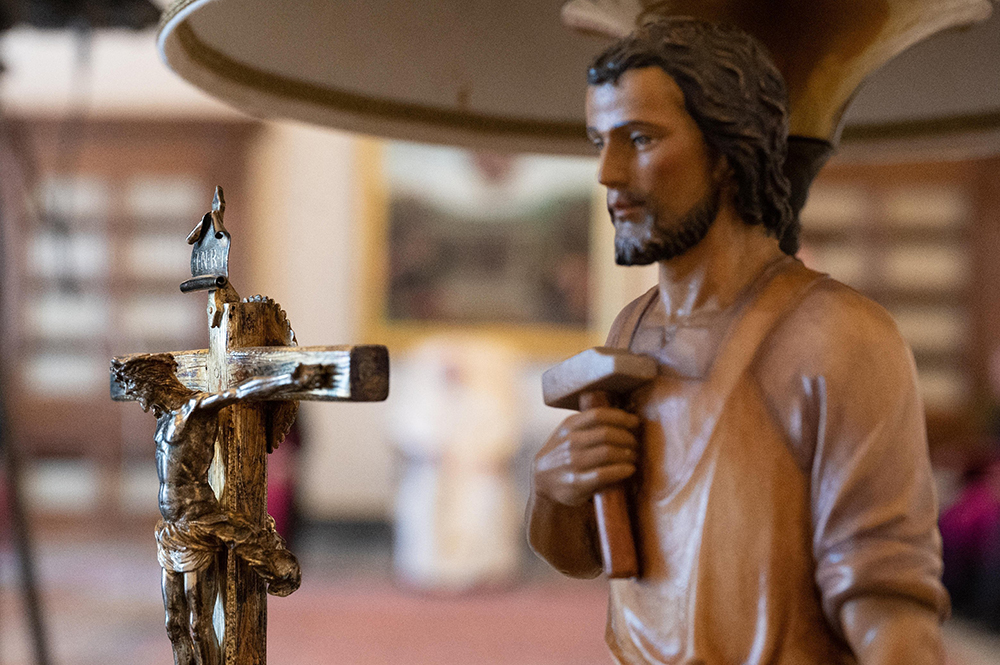
WINDSOR TERRACE — History records very little about St. Joseph.
But according to Pope Francis, the Gospel’s depictions of Jesus’ earthly father are potent examples of a loving family man and a solid worker entitled to enjoy the fruits of his labor.
Pope Francis praised these attributes on Dec. 8, 2020, the 150th anniversary of St. Joseph being proclaimed Patron of the Universal Church by Pope Pius IX. The pope called for a year-long celebration of the saint through Dec. 8 of this year.
The Apostolic Penitentiary issued a decree granting plenary indulgences for the Year of St. Joseph. Indulgences are often misunderstood, even by faithful Catholics.
Sin has two effects. Mortal (grave) sin deprives us of communion with God and makes us incapable of eternal life in heaven. This is called the “eternal punishment” due to sin. When we make a good confession and receive absolution, eternal punishment is removed. Even after that, however, we are still attached to creating things in an unhealthy way. These attachments, which also result from venial (less serious) sins, call for “temporal punishment.”
If a person dies in a state of grace and friendship with God, but with temporal punishment still needed, they will undergo purification in purgatory. Plenary indulgences allow us to avoid this purifying state.
“The sacrament of penance is a sacramental encounter with Christ, where our sins are forgiven,” Bishop Nicholas DiMarzio of the Diocese of Brooklyn said. “An indulgence is speaking to the temporal punishment due to our sins that we have not worked out in our lives.
“We don’t believe that everybody goes to heaven immediately, nor do a lot of people go to hell,” he continued. “But we know that there’s a place of purgation we call purgatory. It’s not a place, but more a process and a state, where if we have not made up for our sins of this life, we do it in the life to come.”
A “partial” indulgence remits some of the temporal punishment due to sin. But a plenary indulgence completely cancels temporal punishment due to sin. Therefore, the plenary indulgence approved for the Year of St. Joseph is an opportunity to make up for our sins fully while still in this world.
Requirements for an indulgence typically include special prayers or visits to a holy place, Bishop DiMarzio said. In this case, those places have a connection to St. Joseph.
“We would have mentioned the churches that are dedicated to St. Joseph in this diocese, attaching a special indulgence to visiting them,” the bishop said. “But because of the COVID, I did not do that. But anybody can go to any church and fulfill the requirements.”
The requirements for the Year of St. Joseph plenary indulgences, like all indulgences, start with going to confession, receiving Holy Communion, and praying for the intentions of Pope Francis.
The Apostolic Penitentiary has also noted that for this indulgence, people must also perform one of these devotions or acts of charity:
- Meditate on the “Our Father” prayer for a half-hour
- Go on a spiritual retreat for at least a day that includes a meditation on St. Joseph
- Do a spiritual or corporal act of mercy
- Recite the rosary as a family or as a married couple
- Entrust daily work to the protection of St. Joseph
- Pray the Litany of St. Joseph or some other prayer to St. Joseph with an appeal for the persecuted church and the relief of persecuted Christians
- People can say any of the approved prayers or do an act of piety in honor of St. Joseph, especially on:
- March 19 (Solemnity of St. Joseph)
- May 1 (Feast of St. Joseph the Worker)
- The 19th of each month
- Every Wednesday (which, traditionally, is dedicated to St. Joseph)
In the decree regarding this indulgence, the Holy See says that the “elderly, the sick, the suffering, and all those who for legitimate reasons are unable to leave the house” can still obtain the indulgence.
But they must have a soul “detached from any sin” and an intention to fulfill, as soon as possible, the three customary conditions and recite an act of piety in honor of St. Joseph, offering to God the pains and hardships of their lives.
Bishop DiMarzio said seekers perform these acts on their own. Clergy members are not needed to supervise the process, but people are free to consult them on the steps, the bishop said.
“This is a particularly complicated concept to get across to people,” he said. “It’s not easy.
“The punishment due to our sins in this world and the next is beyond our understanding. So we always want to be ahead of the game, in a sense.”
“It’s really a reflection of God who is all-merciful,” Bishop DiMarzio said. “We don’t really understand God’s mercy enough.”
But, he added, “If you don’t accept God’s mercy, that he’s all-merciful, you’ll never understand indulgences.”

Saint Joseph is an inspiration for all times. Jesus, Mary and Joseph – Pray for us.